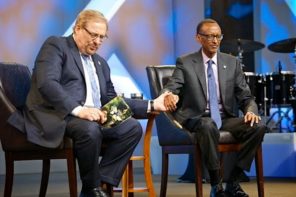The distinguished cleric with gold wire-rimmed glasses, a dark suit, and crimson bishop’s shirt spoke with an African accent and a twinkle in his eye, “We all know about my friend, Dr. Kinsey. Although I think I am straight, who knows? Maybe I am not as straight as I think.” His shoulder swiveled, slightly vampy with this last line, and the audience laughed.
Retired Ugandan Bishop Christopher Senyonjo, 78, was playing to a sympathetic crowd at the San Francisco Lesbian, Gay, Bisexual, and Transgender Community Center on Tuesday night, May 25. The delight of the audience and the esteem in which they held him is not the typical reaction Senyonjo has received since he began ministering to LGBT people nine years ago in his home country of Uganda.
Receiving his theological training in the United States, at Union Theological Seminary and Hartford Seminary, and ordained in New York City in 1964, Senyonjo served as bishop of the Anglican Diocese of Western Uganda from 1974 to 1998. After his retirement, he started a family counseling center.
In 2001, his life changed forever when he met several gay and lesbian young people who had been rejected by their churches. “They had lost jobs and been expelled from school. Some of them were on the verge of committing suicide.” Senyonjo gave them a radical message for their time and place: “If you are gay or lesbian, God made you and loves you that way, and you should accept yourselves.”
Once word of his compassionate advice reached his successors in the Anglican hierarchy in Uganda, there was a firestorm. Senyonjo was asked to “condemn” the people under his care “and convert them to something else.” Senyonjo said he would not. “I cannot see God where there is no love,” he said, “I would rather go with the truth.”
In reaction, he was expelled from the church he had served for 34 years. More significantly for his own survival, the church stripped him of his pension. “The cost has been great,” Senyonjo said of his post-retirement ministry. “It is by the grace of God that I have been able to survive. By the strength of God I have been able to stand.”
The Bishop is touring the United States and Europe, sponsored by the Episcopal LGBT group Integrity USA (among other organizations) to raise awareness about the draconian law being considered by the Ugandan parliament, which would make homosexuality illegal, in some cases punishable by death. The law has been the result, in part, of lobbying by American evangelical groups, and has the partial support of Bishop Henry Orombi, Anglican Primate of Uganda. Having already faced the rejection of his church and loss of his pension for standing up for the equality and spiritual dignity of LGBT people, Senyonjo could face imprisonment for his continued advocacy under a section of the law meant to prevent the “promotion” of homosexuality.
Jay Johnson, an Episcopal priest and Director of Academic Research and Resources for the Center for Lesbian and Gay Studies in Religion and Ministry at Pacific School of Religion in Berkeley, explained:
As mainline churches in the United States have become more accepting of LGBT people on issues like ordination and blessing of same-sex relationships, conservatives in these denominations, particularly the Anglican Communion, have appealed to the Global South to seek affirmation for their homophobia.
“There has been an attempt,” Johnson added, “to marginalize the more tolerant Anglican churches in the United Kingdom, United States, Canada, New Zealand, and Australia, suggesting that the center of the ‘true’ faith—that is, the faith that is still discriminatory towards LGBT people and women—is in Africa and the developing world.”
“The African voices that have dared to stand up against overwhelming spiritual, societal, and governmental pressure, like Bishop Senyonjo, Canon Gideon Byamugisha, Bishop Desmond Tutu, and the South African Council of Churches, have exposed the lie that these dividing lines are as strict as they have been portrayed,” Johnson said. “There are multiple voices and perspectives throughout the Anglican Communion.”
“The revelation is still going on!”
Asked about the his view of revelation and the Bible, Bishop Senyonjo told an audience at Pacific School of Religion, the day before the San Francisco event, “What is the real Word of God? The Logos? Christ is the Logos. And even Jesus said, ‘There are many things to tell you, but you cannot bear them.’ So the revelation is still going on! A lot of discrimination against LGBT people is due to ignorance about human sexuality.” Senyonjo encouraged seminaries around the world to begin to offer courses on human sexuality.
Asked what Americans could do to speak out about the bill being considered by the Ugandan legislature that could end the work he is doing, Senyonjo suggested contacting elected officials in the United States and asking them to express their disapproval of the bill to members of the Ugandan parliament. Mentioning President Obama and Secretary of State Clinton’s condemnation of the bill, Senyonjo said, “The United States is an important country. Some people in Uganda will say, ‘Why are they interfering? We are an independent nation.’ But deep down, they know if the United States is saying it to them it’s important.”
Senyonjo sees his extended ministry as working to decriminalize LGBT people around the world. “Along with heterosexuals, LGBT people are a human phenomenon. Human sexuality is a beautiful thing, if you understand it. The real problem is a lot of ignorance about human sexuality. God has created diversity, and we should embrace it as we embrace the rainbow, because the rainbow is beautiful.”
Bishop Christopher Senyonjo has completed his tour of California, and will be moving on to Minnesota, New York, Dublin, and Belfast (see here for tour details).




